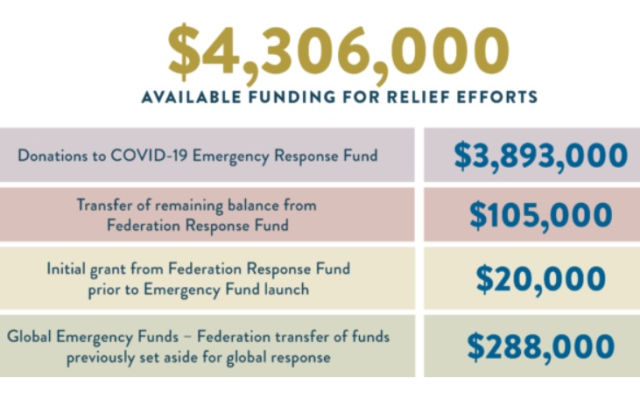COVID-19 Emergency Relief Grants for Present and Future Needs
While the impact of the health crisis on the Jewish community continues, the latest Jewish Federation of Greater Atlanta grants also look ahead on the calendar.
Dave Schechter is a veteran journalist whose career includes writing and producing reports from Israel and elsewhere in the Middle East.

Where the first round of grants from the Jewish Federation of Greater Atlanta’s COVID-19 emergency fund met immediate human needs, the second round extends that focus to include reopening communal institutions.
Round two, announced May 22, totaled more than $1.39 million. All told, the Federation has allocated more than $2.5 million out of its $4.3 million-plus emergency fund.

“Given the increasing needs, an additional $1,390,500 in grants is now being released to our community to help continue to serve the most vulnerable of Atlanta’s Jewish population, as well as help stabilize and support the Jewish ecosystem as we move from relief to recovery,” Eric Robbins, Federation CEO and president, said in a statement.
The largest allocation in the second round was $400,000 to Jewish day schools and $100,000 to pre-schools to help with reopening costs. The schools are facing significant costs as they plan how to reopen in an environment that requires social distancing, enhanced health and sanitation maintenance, and other expenses related to the current public health environment.
Rabbi Ari Leubitz, head of school at Atlanta Jewish Academy, told the AJT that as administrators plan for a hoped-for fall semester back inside buildings that closed in mid-March, the cost of creating a “COVID compliant” school, however that is defined, is a major unknown.

“The cost to run a COVID- compliant school is astronomical,” Leubitz said. He cited considerations that included whether to rearrange schedules to make more efficient use of existing space, how that might require the hiring of additional teachers, the need for increased cleaning of school facilities, and what changes might mean to the operation of school buses and cafeterias.
In the second round of grants, the Marcus Jewish Community Center of Atlanta received $100,000 to aid its reopening, the first phase of which is set for June 1. The Federation also allocated another $108,000 to the MJCCA to meet extended health insurance costs of employees laid off and furloughed. In April, the MJCCA received $202,000 to meet that commitment.
As a sign of the financial trauma in the Jewish community caused by COVID-19, the second round of Federation grants also included $120,000 to Jewish Family & Career Services to meet emergency financial needs and $37,500 to support the JF&CS food pantry. In the first round, JF&CS received $100,000 for emergency financial services and $50,000 for the pantry.
Jewish HomeLife received $75,000 in the second round of grants to help meet the ongoing expense of purchasing personal protective equipment for caretakers in JHL’s residential facilities and home services. JHL previously received $273,000 from Federation to meet costs of staffing, equipment and other needs for the period March, April and May.
The second round of grants included $250,000 to help ensure the financial stability of five regional overnight camps that canceled their summer sessions. In Georgia, those are Camp Barney Medintz, URJ Camp Coleman, and Camp Ramah Darom. The two in North Carolina are Camp Judaea and the URJ 6 Points Sports Academy.
Also receiving $75,000 to maintain organizational stability until normal cash flow returns was the William Breman Jewish Heritage Museum.
The Jewish Community Relations Council of Atlanta received $25,000 in the second round, under the heading of “step-up” grants “for organizations that step in to fill a need presented by the pandemic not provided elsewhere.” The grant recognizes JCRC’s work assisting communal organizations navigating the federal CARES (Coronovirus Aid, Relief, and Economic Security) Act and the Small Business Administration loan program, as well as other collaborations on COVID-19 needs, according to Leslie Anderson, JCRC executive director.
The Federation also allocated up to $100,000 to centralize the purchasing of personal protective equipment that Jewish institutions will need as they prepare for reopening, rather than leaving each entity to fend for itself in a competitive marketplace.
Separately, the Federation allocated $150,000 from a fund designated for global emergencies to provide support in four areas: $50,000 through the Joint Distribution Committee to aid older adults in the former Soviet Union; $25,000 through the Jewish Agency for Israel to assist elderly and Holocaust survivors in Israel cared for by Amigour; $25,000 to the Yemin Orde Youth Village in Israel, which works with at-risk youth, and $50,000 through the Jewish agency to service older adults, children with special needs, and the Ethiopian community in Atlanta’s Israeli sister community of Yokneam and Megiddo.
- Jewish HomeLife
- Camp Barney Medintz
- URJ Camp Coleman
- Camp Ramah Darom
- Camp Judaea
- URJ 6 Points Sports Academy
- jewish federation of greater atlanta
- COVID-19
- Eric Robbins
- atlanta jewish academy
- Rabbi Ari Leubitz
- Marcus Jewish Community Center of Atlanta
- Jewish Family & Career Services
- MJCCA
- JF&CS
- Jewish Community Relations Council of Atlanta



comments